work hardening program vs work conditioning
Designed based on return-to-work goals. However it does not matter what you call your program since the goal is getting the injured worker back to work.

Work Conditioning Vs Work Hardening What S The Difference Robbins Rehabilitation West
These return to work medical treatment programs can assist Injured Workers in returning to their usual and customary occupations modified work positions an alternative work positions or in be provided in conjunction with a.
. Work hardening sessions are 2-4 hours for 3-5 days per week. What is Work Hardening. Delivers weekly progress reports.
Work Conditioning and Work Hardening are constantly intermixed andor misunderstood as being the same thing but they arent. Previous attempts have been made to evaluate the efficacy of work-oriented back pain management programs but none have focused exclusively on work or functional outcomes. The time and length of the sessions can usually be tailored around the patients work schedule.
The difference between work hardening and work conditioning is that work conditioning has a strong emphasis on physically preparing the injured individual to return to work. Work Hardening addresses the issues of productivity safety physical tolerances and worker behaviors. A daily program ranging from 2-4 hours.
What is the Work Conditioning Program. Work hardening is a highly structured program specifically designed to help patients return to their pre-injury work level. Consists of strengthening.
How to best perform job duties post-injury Offers job task simulation. Work hardening includes real or simulated work tasks conditioning. These forms of medical treatment specifically designed for returning to work are Work Hardening and Work Conditioning Programs.
Work Hardening is usually an interdisciplinary individual-ized job specifi c program of activity with the goal of return to work. The Work HardeningConditioning Program is an interdisciplinary approach in rehabilitation which utilizes strength and conditioning techniques to progressively improve biomechanics neuromuscular efficiency cardiovascular endurance and flexibility. 8 rows Work Hardening.
Differences between Work hardening and Work conditioning Definition. APTA Work Conditioning APTA Work Hardening 9112018 140 AM Work conditioning is a work related intensive goal-oriented Rx Program specifically designed to restore an individuals systemic neuromusculoskeletal strength endurance movement flexibility motor control and cardiopulmonary functions. Treatment includes doing things you will need to do at your job such as.
Though many of the attributes of work-hardening and work-conditioning programs are similar there are some basic differences. Work hardening refers to an individualized highly structured and goal-oriented program designed to help an. Involves individual instruction eg.
Includes dynamic group environment. Work Hardening is a highly structured goal-oriented individualized intervention program designed to return the patientclient to work. Upon completion of the program our patients often tell us that theyre in the best physical shape of.
Work conditioning and work hardening are high levels of therapeutic intervention designed to help patients regain enough function to return to work to their normal full time job. Work Conditioning An intensive goal-oriented conditioning program designed to restore neuromuscular and musculoskeletal function including strength power endurance joint mobility ROM motor control cardiovascular endurance and functional abilities. Each program is individualized to treat the patients specific injury and dependent on what the treating physician prescribes.
Work conditioning sessions are 1-3 hours for 2-3 days per week. The program uses real or simulated work tasks to prepare the patient for a safe transition back. Incorporates research and outcomes-based rehabilitation.
7-8 hours per day. Individuals are usually referred to work conditioning and. Work hardening also referred to as work conditioning generally speaking is a course of physical therapy.
Work hardening programs have more of a multidisciplinary approach than work conditioning programs. Addresses work-related tasks and overall de-conditioning. Features 3-5 days per week 4-6 hours per day therapy.
You will have to go through work hardening and work conditions where youll go through simulated work tasks to prepare you to return to your job but in some cases the fate of your employment can be decided here. Each program is different in order to focus on your problems that are keeping you from going back to your normal work tasks. A work-hardening regimen typically pays a bit more attention to behaviors education and safety whereas a work-conditioning program focuses on restoring the physical capabilities required to do your job.
While work hardening focuses on utilizing simulated or real activities to restore behavioural physical and. Since work hardening programs are less and less work conditioning programs by definition tend to be the trend. Physical conditioning programs variously called work conditioning work hardening and functional restorationexercise programs aim to improve work status and function.
An interdisciplinary program running up to 8 hours per day. Work Conditioning WCWork Hardening WH Work conditioninghardening programs are focused on helping you to be able to do your job tasks. Work hardening is multidisciplinary meaning it not only works on recovering the body but also works on returning the workers frame of mind prior to their injury.
What to Expect From It. However this course of therapy differs from ordinary physical therapy because work hardening is focused on getting the person to a level of physical ability to return to their particular job while physical therapy is a general physical regimen to increase overall. The objective of the Work Conditioning.
These programs are ideal for patients that have already progressed through traditional physical therapy but still lack full function in relation to specific duties required on the job. Work Conditioning is a work related intensive goal-oriented treatment program designed to restore an individual systemic neuromusculoskeletal strength endurance movement flexibility and motor control. First you will be asked to describe what you do at your place of employment which will help the physical therapist design a.
The Work Hardening Program WHP utilizes real or stimulated work activities to restore physical behavioral and vocational functions.

Work And Occupational Therapy Ot 460a Overview Define Work Discuss The Ada Discuss Work Related Assessments Fce S Define Type Of Work Related Ppt Download

Work Conditioning Vs Work Hardening What S The Difference Robbins Rehabilitation West

Occupational Rehabilitation Programs Presented By Name Ppt Download
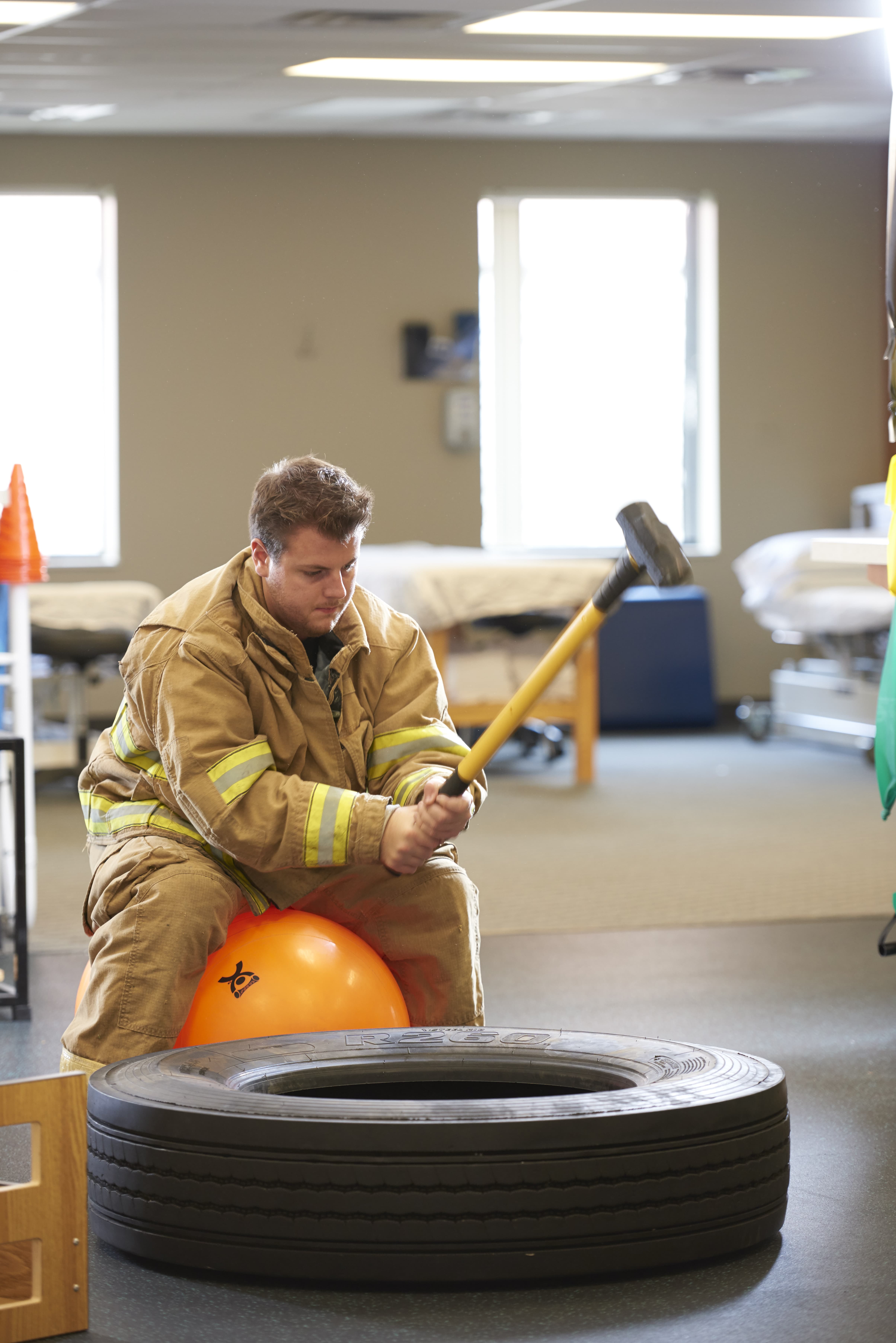
Work Conditioning Team Rehabilitation
Difference Between Work Hardening And Work Conditioning Difference Between
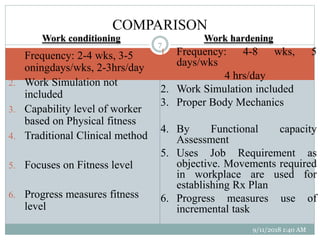
Work Conditioning And Work Hardening

Arbeitsbezogene Rehabilitation Abr Ppt Download
Difference Between Work Hardening And Work Conditioning Difference Between
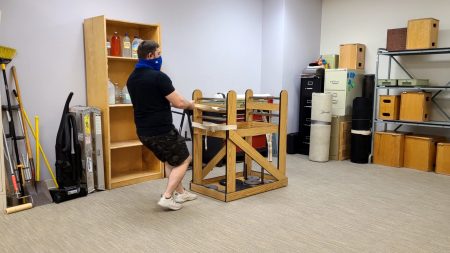
How Work Hardening Conditioning Helps With Work Injuries Sheltering Arms

Work Hardening Programs Ppt Video Online Download
Advanced Work Rehab Work Hardening Program Work Conditioning Program In Springfield Virginia

Worksafe Physical Therapy Are Work Conditioning And Work Hardening The Same Thing In A Word No Work Hardening Is A Highly Structured Multi Disciplinary Program That Includes A Behavior Component Work Hardening Could
Difference Between Work Hardening And Work Conditioning Difference Between
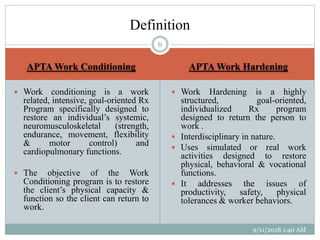
Work Conditioning And Work Hardening
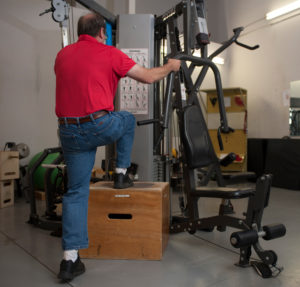
Work Conditioning Vs Work Hardening Job Ready Services

Work Conditioning Program Northeast Rehabilitation Hospital

Work Hardening And Work Conditioning Industry Health Solutions
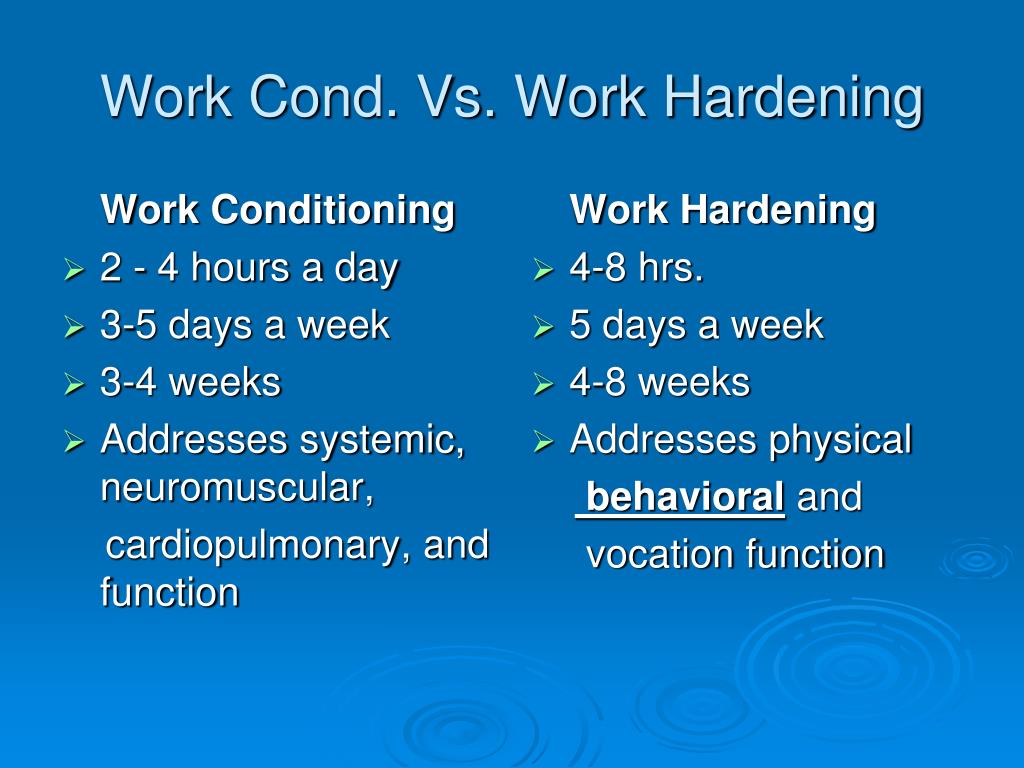
Ppt Helping The Injured Worker Return To Work Understanding The Role Of Work Conditioning Hardening Programs And Fce S Powerpoint Presentation Id 1022319
